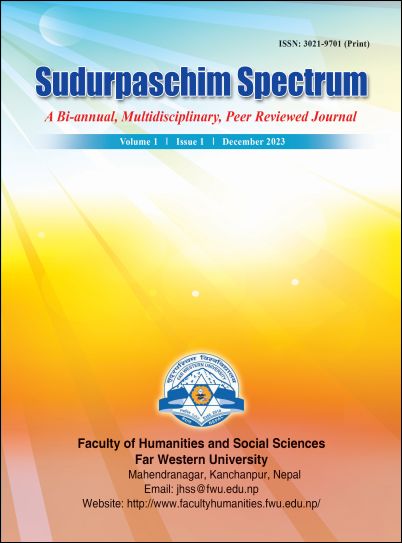Disparity, Empowerment and Female English Language Teacher in Higher Education Context in Bangladesh: A Narrative Inquiry
DOI:
https://doi.org/10.3126/sudurpaschim.v1i1.63386Keywords:
Disparity, participatory parity, negotiation, structural inequality, social justiceAbstract
The existing literature while highlighting learner empowerment, carefully gives less attention to the fact of empowering female teachers in adult English language teaching context. In most contexts worldwide teaching foreign languages is a feminine job (Ortiz &Serrano, 2020; Bashiruddin, 2018; Kollmayer et.al., 2020; Tindowen, 2019), and that mostly remains at a disadvantaged position as she works ‘within a network of power relations’. Hence it is very essential to scrutinize and understand the micro-dynamics of the female teacher’s journey of sense-making and her employment of coping strategies at the time and point of professional disempowerment. This in-depth narrative inquiry tries to investigate the issues that support a female teacher in empowering herself in professional landscapes. In this regard, I used the narrative inquiry research design and exploited semi-structured interviews with six female teachers to generate data to show how female teachers struggle(d) to achieve parity to empower themselves and their learners. Fraser’s (2008; 2009; 2012) notion of ‘participatory parity’ was used here as the theoretical ground to analyze the findings that empowerment is a theory of social change. The result has come out with the view that any attempt at school reform should be synonymous with the most active models of female teacher empowerment to advance student achievement, collegiality, and professional learning. This study thus contributes to the empowerment literature of female English language teachers in the higher education context.
Downloads
Downloads
Published
How to Cite
Issue
Section
License
Copyright (c) 2023 The Author(s)

This work is licensed under a Creative Commons Attribution-NonCommercial 4.0 International License.
This license enables reusers to distribute, remix, adapt, and build upon the material in any medium or format for noncommercial purposes only, and only so long as attribution is given to the creator.




